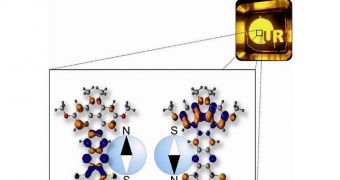German investigators from the University of Bonn and the University of Regensburg announce the creation of a new type of organic light-emitting diode (LED), an advancement that could lead to the development of novel displays for use in tablets, laptops, and smartphones.
The LEDs the team created require very little energy to operate, meaning that future displays using them would tax the batteries of mobile devices a lot less than they do currently. Details of the diodes were published in the latest issue of the journal Angewandte Chemie, AlphaGalileo reports.
OLEDs are the most commonly-used diodes for displays today, but their main disadvantage is that they are able to convert only a quarter of available electricity into light. The new class of OLEDs can convert a much higher amount of current, although exactly how much has not been disclosed.
“It appears that, in our OLED, the molecules can store electrical energy for significantly longer than is conventionally assumed. Our molecules can therefore exploit the spontaneous jumps in spin orientation in order to generate light,” says UB professor Sigurd Höger, a member of the research team.

 14 DAY TRIAL //
14 DAY TRIAL //